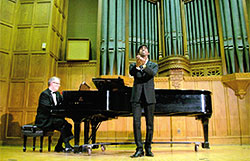|
Why choose opera? Is your family musical?
My parents were not musically trained, but they sincerely appreciate music, and from a young age they encouraged my sisters and I to pursue it. For what itís worth, my father is from the northern region of Karnataka, which is the birthplace of some of the greatest stalwarts in Hindustani music: Bhimsen Joshi, Mallikarjun Mansur, etc. My dad always enjoyed singing. So maybe thereís something in the water out there in northern Karnataka!
My [high school] choir instructor, Ross Heise, spoke with my parents and told them that I had a foreseeable future in opera and that I should get my bachelorís degree in music performance. My parents were all for it. They were very supportive and encouraging, and I am eternally grateful to them for that.
Western classical music is a genre that has stood the test of time, and it will live on long after Iím gone. I believe that itís my calling in life to do justice to the composer, to the very best of my ability. I know that may sound like some cheesy Hallmark card, but itís genuinely how I feel.
 |
Zeshan Bagewadi giving a recital in Evanston, Illinois, accompanied by Ken Smith on the piano. Photo courtesy: Zeshan Bagewadi
|
How much training does one have to go through to be able to carry a significant role in an opera production?
First and foremost, you have to be musically sound. Second, you have to be dramatically sound. I like to compare the singerís voice to a painterís palette. The painter has a palette of different colors, and he uses them to paint the picture or create an effect. Similarly, the singerís voice has different colors, and the singer must learn to use those different colors to bring out different human emotions: love, hatred, joy, sadness, fear, anger, etc.
How are you perceived as an Indian singing opera? Are people surprised?
Oh, yes! People are definitely surprised...both Indians and non-Indians, but especially Indians. I can understand this, though. Itís because it is not the career path that desis would expect another desi to follow. The most common question I get from other desis is, ďSo did your parents support your decision?Ē Once I was even asked if they had kicked me out of the house. Well, the way my dad explained it to me was, ďWe have plenty of doctors. Do something different!Ē Iím considered by many to be a pioneer in this regard, because there arenít any Muslim Indian opera singers in the field.
What influence does Indian classical music have on you? What are the differences in singing the two genres?
In 2007, I became a disciple of a Hindustani vocalist from the Kirana Gharana, Nagarajarao Havaldar. I went to Bangalore and studied with him, and for this, I received course credit from Northwesternís School of Music. It was an unforgettable experience for me. I had been so used to singing Western music that was written hundreds of years ago, and learning it from a score, so it was completely different to learn Hindustani music.
Sebastian John is an Indian journalist living in Washington, D.C.
óCourtesy SPAN.
|